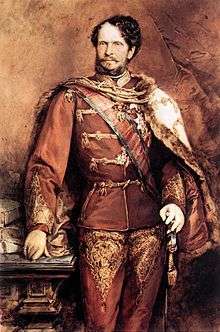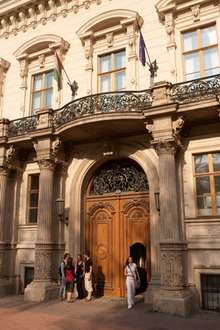Andrássy University Budapest
|
Andrássy Gyula Budapesti Német Nyelvű Egyetem Andrássy Gyula Deutschsprachige Universität Budapest | |
|
| |
| Motto | We make you fit for Europe! |
|---|---|
| Type | University |
| Established | 2 September 2002 |
| Endowment | Open Foundation for the German Speaking University of Budapest |
| Chancellor | Domahidi Ákos, LL.M.[1] |
| Rector | Prof. Dr. András Masát |
Academic staff | 51 |
| Students | 200 |
| Location | Budapest, Hungary |
| Campus | 1088 Budapest, Pollack Mihály tér 3. |
| Nickname | AUB |
| Website | www.andrassyuni.eu |
Andrássy University Budapest (AUB) (full name: Andrássy Gyula German Speaking University Budapest/Andrássy Gyula Deutschsprachige Universität Budapest) is a private university in Budapest, the capital of Hungary. The university started on 2 September 2002 and is the first German-speaking university in non German-speaking Central Europe.
Foundation and partner countries
The Andrássy University Budapest was founded in 2001 by Hungary, Germany, Austria, Bavaria, and Baden-Württemberg. The partner countries are Hungary, Germany, Austria, Switzerland, Bavaria, Baden-Württemberg and Italian autonomous region Trentino-Alto Adige/Südtirol.[2]
Characteristics
The AUB is the only fully German-speaking university outside the German-speaking countries and a private and non-profit university. The 1:7 relation of professors to students allows studies in small groups. Students from more than 25 nations provide intercultural exchange. The students have the possibility to cover the tuition fees through official scholarships.
Eponym of the university is the Hungarian statesman Count Gyula Andrássy de Csíkszentkirály et Krasznahorka who as Prime Minister of Hungary from 1867 to 1871 and as Foreign Minister of Austria-Hungary from 1871 to 1879 was committed to peaceful and stable relations in Central Europe.
The AUB is “University of National Excellence” in Hungary and is the only university abroad, which is system-accredited in Germany by evalag (Evaluation Agency Baden-Württemberg).
Concepts
The following elements are the cornerstones of the AUB srategy:[3]
German, outside the German language area
With its extensive German course selection as well as with its advantages of being a German institution, AUB contributes to the maintenance and improvement of this target group.
A multinational community of teachers and students
At AUB, students from more than 25 European countries meet to conduct their studies. The presence of professors from around the world creates study conditions which could not be achieved by the usual student or professor mobility.
European focus on research and instruction
European topics, including those regarding European integration, lie in the focus of research and instruction of all disciplines at AUB, whereby the Central and Eastern European countries and the Danube region are taken into particular consideration.
Focus


The focus of teaching at the AUB is on the History, Law and Politics of the Eastern and Central European states. In the three faculties International Relations, Central European Studies and Comparative Law and Governance, students can choose one of the following Master Degree or Postgraduate Programmes:
Masters Degree programmes:
- International Economy and Business
- International Relations
- Central European History
- European and International Administration
Postgraduate programmes:
- International and European Administration (LL.M.)
- International Business Law (LL.M.)
- Central European Studies (MA)
In the Ph.D. programmes students can specialize in Politics, History, Comparative Law and Governance as well as Economics.[4]
Studies
Andrássy University Budapest offers international study programmes in the German language. There are scientists from every German-speaking country as well as from Hungary, together with students from more than 25 nations.
In small international study teams of 15 to 20 students, intercultural competence is an everyday practice.
There is a choice of six master's programmes: four consecutive master's and two second master's. Students benefit from the support of AUB through affordable tuition fees and the additional scholarship programmes from Germany, Austria, Switzerland and the Visegrád countries.[5]
Aims
In addition to encouraging the use of German as an academic language, the AUB aims to support and consolidate the cooperation of the states around the Danube, the education of European experts as well as multidisciplinary and multicultural teaching and research.
Building
Home of the AUB is the historical Festetics Palota built by the Hungarian architect Miklós Ybl for the Hungarian statesman György Festetics and located in the centre of Budapest in the neighbourhood of the Hungarian National Museum.
Partner universities
The partner universities of AUB:[6]
- Hungary
- Corvinus University of Budapest
- Nyíregyházi Főiskola
- Germany
- University of Bamberg
- University of Bayreuth
- Humboldt University of Berlin
- Ruhr University Bochum
- Heinrich Heine University of Düsseldorf
- University of Erlangen-Nuremberg
- Viadrina European University, Frankfurt/Oder
- Zeppelin University, Friedrichshafen
- University of Greifswald
- HSBA Hamburg School of Business Administration
- University of Hamburg
- Ruprecht-Karls-University Heidelberg
- Karlshochschule International University
- Christian-Albrechts-Universität zu Kiel
- Westfälische Wilhelms-Universität Münster
- University of Passau
- University of Regensburg
- University of Administrative Sciences, Speyer
- University of Tübingen
- University of Ulm
- University of Witten-Herdecke
- Other countries
- Université Libre de Bruxelles, Belgium (2011/13)
- Université de Liège, Belgium
- Institut d’études politiques de Paris, France
- Jagiellonian University Kraków, Poland
- West University of Timișoara, Romania
Related persons
- Peter Frankenberg, German researcher, professor and politician; rector of University of Mannheim from 1994 to 2001; member of the university council
- Gabriele Stauner, German politician (CSU) and member of the European Parliament from 1999 to 2009 and 2013 to 2014; member of the university council
See also
References
- ↑ "Archived copy". Archived from the original on 2011-10-11. Retrieved 2012-03-01. Chancellor of the AUB, 01.03.2012
- ↑ Partner countries of AUB, 06.03.2012
- ↑ Concept of the university, 06.03.2012
- ↑ "Archived copy" (PDF). Archived from the original (PDF) on 2015-06-07. Retrieved 2012-03-06. Short profile of the AUB, 30.05.2011
- ↑ Studies at AUB, 06.03.2012
- ↑ "Archived copy". Archived from the original on 2012-01-04. Retrieved 2012-03-06. Partner universities of the AUB 06.03.2012
External links
- Official website (German)
Coordinates: 47°29′30″N 19°03′51″E / 47.4918°N 19.0642°E